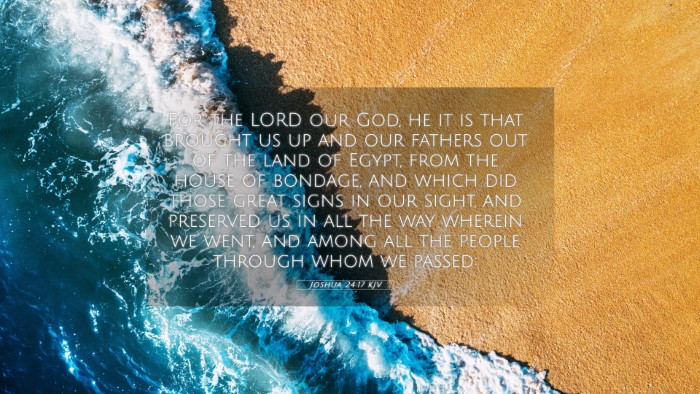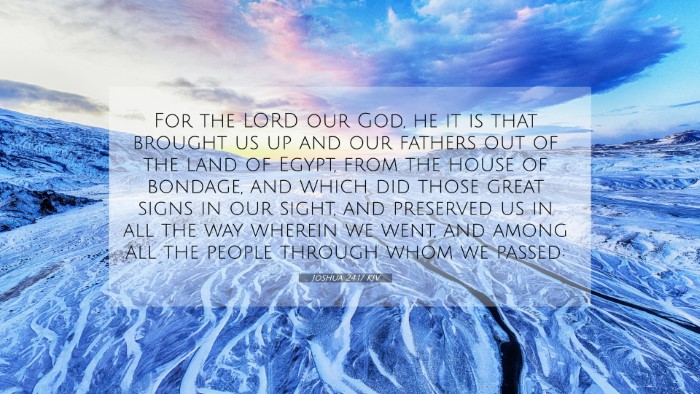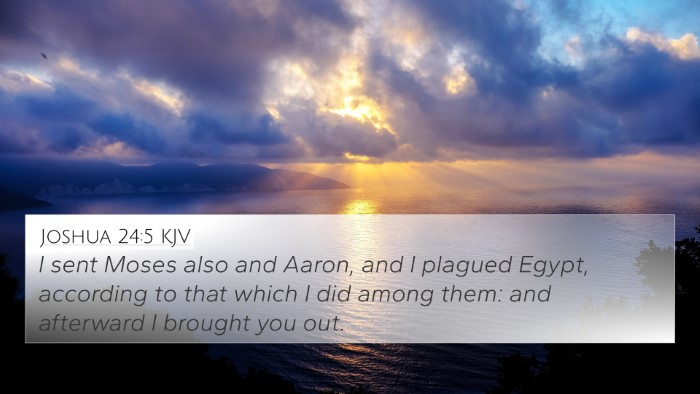Understanding Joshua 24:17
Verse: “For the Lord our God, He it is that brought us up and our fathers out of the land of Egypt, from the house of bondage, and which did those great signs in our sight, and preserved us in all the way wherein we went, and among all the people through whom we passed.” (Joshua 24:17)
Summary: This verse captures the essence of Israel’s recognition of God’s deliverance and providence. Joshua reminds the Israelites of their past, emphasizing not just God's power but also His ongoing involvement in their lives.
Commentary Insights
This verse can be further understood by exploring commentaries from notable scholars such as Matthew Henry, Albert Barnes, and Adam Clarke. Below are key insights extracted from these public domain commentaries:
- Matthew Henry: Henry emphasizes the importance of remembering God's deliverance from bondage. He notes that the Israelites not only acknowledge their past rescue from Egypt but also the continuous guidance God has provided them. This acknowledgment serves as a foundation for their covenant relationship with God.
- Albert Barnes: Barnes elaborates on the historical context, stating that the mention of signs and wonders points to God's miraculous interventions during the Exodus. He highlights that this historical memory serves to inspire faith among the people and calls them to faithfulness in their covenant with God.
- Adam Clarke: Clarke comments on the concept of 'bondage,' referring to sin and the state of human vulnerability. He explains that by recalling their history of emancipation, the Israelites can comprehend the importance of their ongoing commitment to worship and serve the God who liberated them.
Bible Verse Cross-References
Here are some connections between Bible verses that reflect similar themes of deliverance and God's faithfulness:
- Exodus 20:2: “I am the Lord your God, who brought you out of the land of Egypt, out of the house of bondage.”
- Deuteronomy 6:12: “Then beware, lest you forget the Lord who brought you out of the land of Egypt, from the house of bondage.”
- Psalms 106:7-8: “Our fathers in Egypt did not understand your wonders; they did not remember the abundance of your steadfast love, but rebelled by the sea, at the Red Sea.”
- Lamentations 3:22-23: “The steadfast love of the Lord never ceases; his mercies never come to an end; they are new every morning; great is your faithfulness.”
- Galatians 5:1: “For freedom Christ has set us free; stand firm therefore, and do not submit again to a yoke of slavery.”
- Romans 8:28: “And we know that for those who love God all things work together for good, for those who are called according to his purpose.”
- Hebrews 13:5: “He will never leave you nor forsake you.”
Thematic Connections
The themes of God's deliverance, faithfulness, and covenantal commitment resonate throughout Scripture. The following points outline these thematic connections:
- Deliverance from Oppression: The liberation from Egypt is a central theme in both the Old and New Testament, symbolizing spiritual freedom.
- Faithfulness through Trials: God’s continuous guidance is illustrated from the wilderness period to the establishment of Israel in Canaan.
- Collective Memory: Israel's communal recollection of God's acts of salvation reinforces their identity as a people chosen by God.
Cross-Referencing Biblical Texts
Tools for Bible Cross-Referencing: Engaging with cross-references helps deepen understanding of scripture. Utilizing resources such as:
- Bible concordance
- Bible cross-reference guide
- Comprehensive Bible cross-reference materials
Practical Application
For believers today, Joshua 24:17 serves as a reminder to reflect upon personal spiritual journeys and recognize God's hand in their lives. Here are a few ways to apply this verse:
- Maintain a journal of God’s past faithfulness and providence.
- Engage in communal worship to remember God's goodness as a community.
- Encourage others by sharing testimonies of deliverance and faithfulness.
Conclusion
In summary, Joshua 24:17 is a profound reminder of God's historical deliverance, encouraging us to recognize His present guidance. By examining cross-references and reflecting on related themes, we enrich our understanding of biblical truths and their relevance in our lives.








